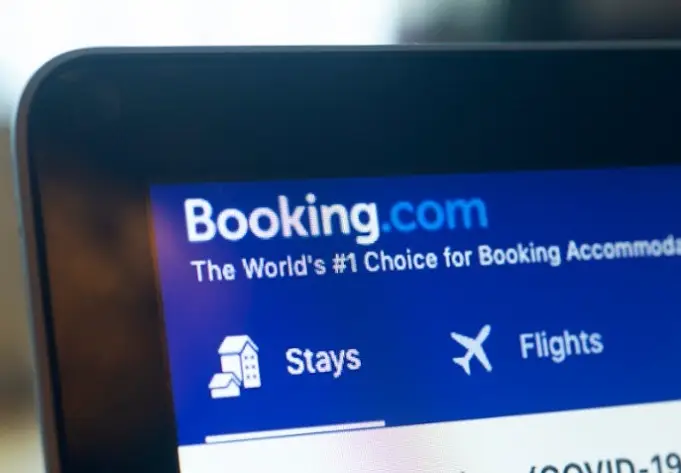
Hotel News: Pan European Legal Earthquake Rocks Booking Dot Com Over Decades of Anti-Competitive Practices
A legal storm is sweeping across Europe’s hospitality industry as more than 25 national hotelier associations, backed by HOTREC—the authoritative voice of European hospitality—have united in a historic cross-border lawsuit against Booking.com. The legal action, coordinated by the Stichting Hotel Claims Alliance, marks a bold and determined response to over two decades of what the courts and industry leaders now regard as anti-competitive and predatory practices by the powerful online travel platform.

Image Credit: StockShots
At the heart of this legal uprising is a long-standing grievance: Booking.com’s use of “parity clauses,” which contractually barred hotels from offering lower prices on their own websites or alternative platforms. These clauses have long shackled hotels across the continent, inflating commission fees and curtailing pricing freedom. The catalyst for this massive legal mobilization was the landmark ruling by the European Court of Justice (ECJ) on 19 September 2024, which concluded that these practices were a clear breach of EU competition law. This Hotel News report delves into how the hospitality sector is rising to reclaim its autonomy, with tens of thousands of hotels now seeking financial redress.
The Hidden Cost of Parity Clauses
For nearly twenty years, Booking.com’s parity clauses acted like a digital leash, preventing hotels from advertising better deals anywhere other than the platform. This arrangement not only removed competitive pricing from the equation but also inflated Booking.com’s commission earnings—charges that individual hotels, especially smaller independents, were forced to bear in silence. Hotel owners lost control over their own pricing strategies, often paying commissions upwards of 15% to 20% simply to appear on a platform that was also limiting their freedom.
The ECJ’s ruling has finally turned the tide. Judges confirmed what hotel owners and national competition authorities had long suspected: Booking.com’s clauses stifled fair market behavior, harmed price transparency, and unfairly disadvantaged hoteliers, especially those lacking the negotiating power of large multinational chains. As a result, thousands of hotels across Europe are now being encouraged to sign up for a streamlined legal process that could recoup years of excessive commissions—along with accrued interest—from as far back as 2004.
Greece and Germany at the Heart of the Legal Fight
The Hellenic Chamber of Hotels and Germany’s hotelier association (IHA) are leading voices in this movement. Notably, Booking.com broke off negotiations with IHA in 2021 and even initiated legal action against hundreds of German hotels in Amsterdam. These aggressive tactics only intensified calls for a unified legal response. Greece, which has seen its hotels suffer heavily under these restrictive pricing rules, has also become a flashpoint. Alexandros Vassilikos, President of the Hellenic Hotel Association and HOTREC, remarked, “This is a substantial opportunity for Greek hoteliers to exercise their legal rights and contribute to a fairer digital environment.”
Parity clauses disproportionately hurt independent and boutique hotels, which often rely on flexible pricing and direct bookings to remain competitive. By preventing hotels from promoting lower rates on their websites, Booking.com reduced the incentive for consumers to book directly—leading to reduced margins, lost autonomy, and suppressed innovation in the hospitality sector.
A Pan European Unity Never Seen Before
The collective action is being undertaken in the Netherlands, selected for its legal system’s efficiency in handling cross-border disputes. The claim is supported by hotelier associations from Austria, Belgium, Croatia, Cyprus, Czech Republic, Denmark, Estonia, Finland, Germany, Greece, Hungary, Iceland, Ireland, Italy, Latvia, Liechtenstein, Lithuania, Luxembourg, Netherlands, Norway, Poland, Portugal, Romania, Slovakia, Slovenia, and Switzerland.
Hotels eligible to participate simply need to show that they paid commissions to Booking.com between 2004 and 2024. Registration is available at https://www.mybookingclaim.com/ , with a deadline of 31 July 2025. The entire process has been designed to be accessible and transparent, with legal costs minimized by grouping claims into a class-action-style structure.
Specialized competition lawyers and economists, many of whom were instrumental in the ECJ’s 2024 decision, will support the case. Their expertise is expected to add significant legal weight and credibility to the claim, making this one of the most coordinated and high-stakes legal undertakings in European hospitality history.
A Message to All Digital Marketplaces
Although this legal action targets Booking.com specifically, the implications go far beyond a single company. The ruling and collective response send a clear signal to all digital intermediaries that exploitative or restrictive practices will face legal reckoning under European Union law. Regulators and industry leaders across the continent are watching closely. The precedent set by this case could reshape the contractual foundations of how online travel agencies and digital marketplaces operate in Europe.
The European hospitality sector is also gaining strength from this momentum. With the pandemic having exposed many vulnerabilities in tourism and travel, independent hoteliers are eager to secure better terms, rebuild customer trust, and future-proof their operations against monopolistic digital behavior.
Meanwhile in Thailand, Australia, Canada, United States, Asia and the Middle East, incompetent hotel associations and hoteliers there are doing nothing there about the unfair practices of various OTA platforms such as Bookings Dot Com, Agoda, Expedia, Traveloka etc but rather are rimming the arses of these OTAs!
The Hotel Industry’s Turning Point
This sweeping lawsuit represents a tectonic shift in how the hospitality industry engages with digital platforms. Rather than being beholden to tech giants, hotels are asserting their rights, reclaiming their pricing autonomy, and demanding fair treatment in a marketplace that has long been skewed in favor of large digital players. The ripple effects of this action are already being felt, with travel platforms likely reassessing their policies to avoid future legal entanglements.
For hotel operators, the opportunity to join this lawsuit is more than just a shot at financial compensation—it is a collective stand for dignity and fairness. It is a moment to shape the digital future of travel bookings and create a landscape where innovation and transparency can thrive once again.
The case is already being described by industry insiders as a landmark moment for European hospitality. It could very well inspire similar actions in other sectors where digital platforms exert dominant, and sometimes abusive, influence over small service providers. From restaurants to independent retailers, the spirit of this legal challenge could set a precedent across the service economy.
As European hoteliers push forward with this unprecedented lawsuit against Booking.com, the message is loud and clear—monopolistic control and exploitative practices will no longer be tolerated. The hospitality industry is ready to defend its future, one lawsuit at a time.
For the latest on the fight against OTAs, keep on logging to Bangkok Hotel News.






